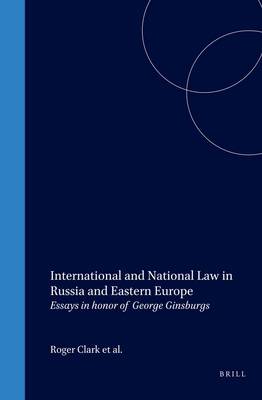
- Afhalen na 1 uur in een winkel met voorraad
- Gratis thuislevering in België vanaf € 30
- Ruim aanbod met 7 miljoen producten
- Afhalen na 1 uur in een winkel met voorraad
- Gratis thuislevering in België vanaf € 30
- Ruim aanbod met 7 miljoen producten
Zoeken
International and National Law in Russia and Eastern Europe
Essays in Honor of George Ginsburgs
€ 439,95
+ 879 punten
Omschrijving
The disappearance of the USSR as a superpower, to be replaced by the Russian Federation and a host of new states, has had wide-ranging consequences in the field of law. The establishment of market economies and the need to set up institutional frameworks to foster the rule of law have precipitated comprehensive domestic law reforms in the countries concerned.
The major focus of the present work, however, is on the metamorphosis of the network of international law relations, brought about by the fundamental change in the political and constitutional climate and the emergence of numerous new actors. Apart from the relations between states as the classical province of international law, the impact of international law on national legal orders has acquired overwhelming importance and the successor states of the Soviet Union have not escaped the effect of this development. Some of the most urgent questions thrown up by these developments are analyzed by a team of leading legal specialists from the Russian Federation, North America, and Western Europe.
The major focus of the present work, however, is on the metamorphosis of the network of international law relations, brought about by the fundamental change in the political and constitutional climate and the emergence of numerous new actors. Apart from the relations between states as the classical province of international law, the impact of international law on national legal orders has acquired overwhelming importance and the successor states of the Soviet Union have not escaped the effect of this development. Some of the most urgent questions thrown up by these developments are analyzed by a team of leading legal specialists from the Russian Federation, North America, and Western Europe.
Specificaties
Betrokkenen
- Uitgeverij:
Inhoud
- Aantal bladzijden:
- 492
- Taal:
- Engels
- Reeks:
- Reeksnummer:
- nr. 49
Eigenschappen
- Productcode (EAN):
- 9789041116543
- Verschijningsdatum:
- 1/08/2001
- Uitvoering:
- Hardcover
- Formaat:
- Genaaid
- Afmetingen:
- 164 mm x 249 mm
- Gewicht:
- 902 g

Alleen bij Standaard Boekhandel
+ 879 punten op je klantenkaart van Standaard Boekhandel
Beoordelingen
We publiceren alleen reviews die voldoen aan de voorwaarden voor reviews. Bekijk onze voorwaarden voor reviews.







